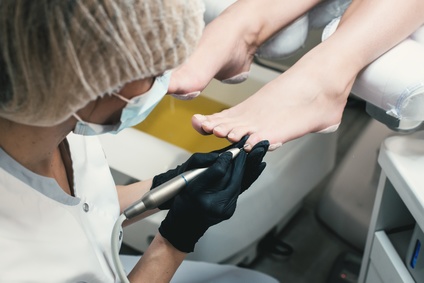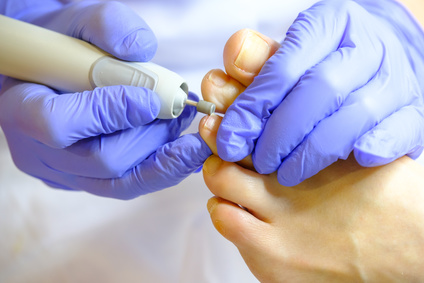Thickened toenails is something our Oakville Chiropodists commonly treat. Thick toenails are particularly common in the elderly population and in people with diabetes.
While it is easy to ignore thick toenails and put on socks to hide them, they will not get better on their own. Thickened toenails are usually a sign of having an underlying problem that should be addressed.
What Causes Thickened Toenails?
Thickened toenails are usually the result of either a fungal infection or psoriasis. Some other possible causes of thick toenails include diabetes, aging, yellow nail syndrome, injury to the nail, and rams horn nails (onchygryphosis).
Fungal Nail Infections
The most common cause of thick toenails are fungal nail infections. the medical term for a fungal nail infection is onychomycosis or tine unguium
Symptoms of Fungal Nail Infections:
You may notice that fungal nail infections usually develop initially around the edge of the nail and the spreads towards the nails middle.
With the fungal infection spreading, the nail thickens and becomes discoloured. The discolouration of the fungal nail is usually yellow, white, brown or black. The toenails with fungal infections become more brittle as they thicken. Small pieces of the nail may even break off.
When the toenail fungal infection worsens you may notice pain as some swelling may develop around and under the nail. The toenail may also lift from the nail bed. You may notice an unpleasant odour as a result of the infection.
As symptoms worsen from a fungal toenail infection, this is often when people seek the expertise of our Oakville Chiropodist. While a fungal toenail infection is very treatable with the help of a foot specialist such as a Chiropodist, like many things it’s best to treat it early.

What are the causes of toenail fungus?
Thickened toenail fungus infections are typically caused by:
- Aging – fungal toenail infections are most common in those over 60 years of age. This is because nails naturally are a little thicker and slower to grow with age/ the blood supply also decreases especially in people prone to vascular issues or with atherosclerosis, leading to increase risk of fungal toenail infection.
- Health Conditions – such as diabetes, circulatory problems and psoriasis
- Weakened Immune System – decreases your bodies natural ability to fight fungal infections
- Nail Injury – damage to toenails allows fungus to potentially invade and infect the nail
- Poor Foot Hygiene-failing to keep the feet clean and dry. Wear sandals in public change rooms and showers and dry your feet before putting on socks. Change socks after a workout also.
- Walking Barefoot – in areas such as swimming pools, public showers and gyms.
- Footwear – shoes that are too tight and shoes that don’t allow your feet to breathe leading them to become hot and sweaty are the ideal breeding ground for fungus

If you do have a fungal toenail infection, they can be highly contagious. It is vital to help prevent spreading the infection. Keep your feet clean and dry as well as covered.
Treatment for Fungal Toenail Infections:
After confirming the diagnosis of fungal toenail infection with your Chiropodist, they will discuss your treatment options. Your Chiropodist may suggest treatment for your fungal toenails that include one or a couple of the following:
- Medications – these may be oral or topical. They will be able to help you choose what is best based on your medical history and your toenails. These can take some time so it is important to be patient while continuing to be impeccable with your foot hygiene.
- Nail Removal.
- Natural Remedies such as tea tree oil.
- Good Foot Hygiene
- Wear well-fitting breathable footwear
- keep your toenail trimming equipment to yourself

Call our North Oakville foot clinic to book in with our Chiropodist. (905)582-9700.

